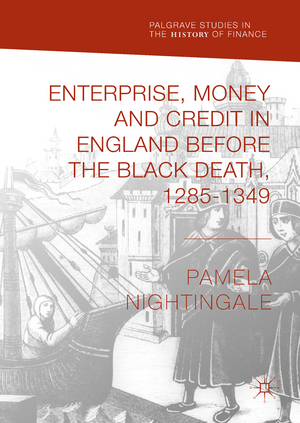Enterprise, Money and Credit in England before the Black Death 1285–1349: Palgrave Studies in the History of Finance
Autor Pamela Nightingaleen Limba Engleză Hardback – 2 aug 2018
| Toate formatele și edițiile | Preț | Express |
|---|---|---|
| Paperback (1) | 783.20 lei 43-57 zile | |
| Springer International Publishing – 10 ian 2019 | 783.20 lei 43-57 zile | |
| Hardback (1) | 794.39 lei 43-57 zile | |
| Springer International Publishing – 2 aug 2018 | 794.39 lei 43-57 zile |
Din seria Palgrave Studies in the History of Finance
-
 Preț: 362.10 lei
Preț: 362.10 lei - 9%
 Preț: 764.93 lei
Preț: 764.93 lei - 9%
 Preț: 626.29 lei
Preț: 626.29 lei - 18%
 Preț: 737.26 lei
Preț: 737.26 lei - 15%
 Preț: 522.89 lei
Preț: 522.89 lei -
 Preț: 451.65 lei
Preț: 451.65 lei - 15%
 Preț: 701.06 lei
Preț: 701.06 lei - 18%
 Preț: 726.37 lei
Preț: 726.37 lei - 15%
 Preț: 712.22 lei
Preț: 712.22 lei - 15%
 Preț: 530.25 lei
Preț: 530.25 lei - 18%
 Preț: 1114.21 lei
Preț: 1114.21 lei - 18%
 Preț: 1006.55 lei
Preț: 1006.55 lei - 18%
 Preț: 726.06 lei
Preț: 726.06 lei - 18%
 Preț: 786.84 lei
Preț: 786.84 lei - 18%
 Preț: 792.03 lei
Preț: 792.03 lei - 18%
 Preț: 724.94 lei
Preț: 724.94 lei - 15%
 Preț: 702.54 lei
Preț: 702.54 lei - 18%
 Preț: 723.69 lei
Preț: 723.69 lei -
 Preț: 388.72 lei
Preț: 388.72 lei - 15%
 Preț: 694.19 lei
Preț: 694.19 lei - 18%
 Preț: 782.72 lei
Preț: 782.72 lei - 15%
 Preț: 637.59 lei
Preț: 637.59 lei - 18%
 Preț: 1108.51 lei
Preț: 1108.51 lei - 9%
 Preț: 920.30 lei
Preț: 920.30 lei - 15%
 Preț: 711.89 lei
Preț: 711.89 lei -
 Preț: 383.12 lei
Preț: 383.12 lei - 18%
 Preț: 891.33 lei
Preț: 891.33 lei - 18%
 Preț: 958.25 lei
Preț: 958.25 lei - 18%
 Preț: 1008.28 lei
Preț: 1008.28 lei -
 Preț: 445.88 lei
Preț: 445.88 lei - 18%
 Preț: 1113.58 lei
Preț: 1113.58 lei - 15%
 Preț: 646.75 lei
Preț: 646.75 lei - 15%
 Preț: 702.05 lei
Preț: 702.05 lei -
 Preț: 450.11 lei
Preț: 450.11 lei - 18%
 Preț: 948.29 lei
Preț: 948.29 lei - 15%
 Preț: 697.97 lei
Preț: 697.97 lei - 18%
 Preț: 728.74 lei
Preț: 728.74 lei
Preț: 794.39 lei
Preț vechi: 968.76 lei
-18% Nou
Puncte Express: 1192
Preț estimativ în valută:
152.00€ • 159.13$ • 125.78£
152.00€ • 159.13$ • 125.78£
Carte tipărită la comandă
Livrare economică 07-21 aprilie
Preluare comenzi: 021 569.72.76
Specificații
ISBN-13: 9783319902500
ISBN-10: 3319902504
Pagini: 243
Ilustrații: XVIII, 382 p. 4 illus., 1 illus. in color.
Dimensiuni: 148 x 210 mm
Greutate: 0.8 kg
Ediția:1st ed. 2018
Editura: Springer International Publishing
Colecția Palgrave Macmillan
Seria Palgrave Studies in the History of Finance
Locul publicării:Cham, Switzerland
ISBN-10: 3319902504
Pagini: 243
Ilustrații: XVIII, 382 p. 4 illus., 1 illus. in color.
Dimensiuni: 148 x 210 mm
Greutate: 0.8 kg
Ediția:1st ed. 2018
Editura: Springer International Publishing
Colecția Palgrave Macmillan
Seria Palgrave Studies in the History of Finance
Locul publicării:Cham, Switzerland
Cuprins
Chapter 1. The Place of Credit and Coin in the Medieval English Economy.- Chapter 2. The Records of the Statutes of Acton Burnell, and Merchants, 1284–1349.- Chapter 3. The Contribution of Alien Creditors to the English Economy, 1285–1289.- Chapter 4. English Wealth and Credit, 1285–1289.- Chapter 5. The Growth of English Credit, 1290–1294.- Chapter 6. Warfare, Currency Confusion, and Falling Credit, 1295–1299.- Chapter 7. Recovery and New Patterns of Credit, 1300–1304.- Chapter 8. Monetary Expansion and Economic Growth, 1305–1309.- Chapter 9. Crises, Conflicts, and Mercantile Credit, 1311–1329.- Chapter 10. Warfare, Gold, and Regional Disparities, 1330–1339.- Chapter 11. English Financiers, a Gold Currency and Plague, 1340–1349.- Chapter 12. Conclusions.
Notă biografică
Pamela Nightingale read history at Newnham College, Cambridge, where she stayed to do research for a Ph.D. which she was awarded in 1963. Her first three books were on the history of British India and Chinese Central Asia from the eighteenth to the twentieth centuries, until she changed her field to write a book on the trade and politics of medieval London. Her research led her to investigate and then to calendar the huge collection of certificates of debt in the National Archives on which this present book is based. Her publications, two Senior Research Fellowships held at the Ashmolean Museum, and regular participation in an Oxford research seminar on medieval economic and social history led to her election in 1999 as a member of Oxford University's Faculty of History, and in 2010 she was awarded an Oxford D.Litt. She is also a Fellow of the Royal Historical Society.
Textul de pe ultima copertă
This book charts the contributions made to the development of the late medieval English economy by enterprise, money, and credit in a period which saw its major export trade in wool, which earned most of its money-supply, suffer from prolonged periods of warfare, high taxation, adverse weather, and mortality of sheep. Consequently, the economy suffered from severe shortages of coin, as well as from internal political conflicts, before the plague of 1348-9 halved the population. The book examines from the Statute Merchant certificates of debt, the extent to which credit, which normally reflects economic activity, was affected by these events, and the extent to which London, and the leading counties were affected differently by them. The analysis covers the entire kingdom, decade by decade, and thereby contributes to the controversy whether over-population or shortage of coin most inhibited its development.
Caracteristici
Charts the relative contribution made to the development of the late medieval English economy by enterprise, money and credit Covers the entire kingdom, while concentrating on the ten counties which recorded the most credit in each period Highlights key differences in regional enterprise which arose from differences in the natural assets of a region, and its ease of access to overseas trade
